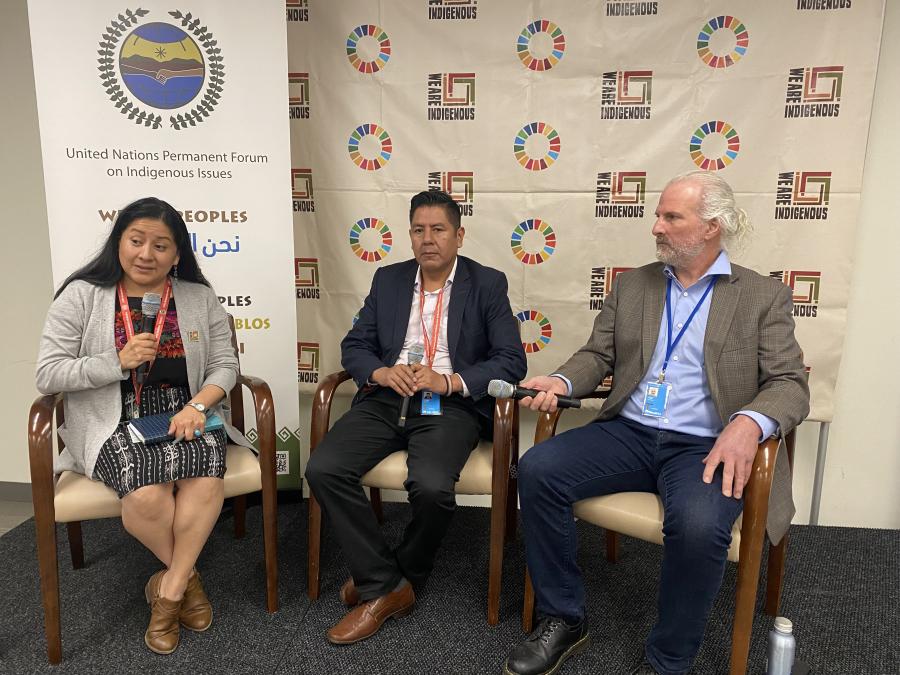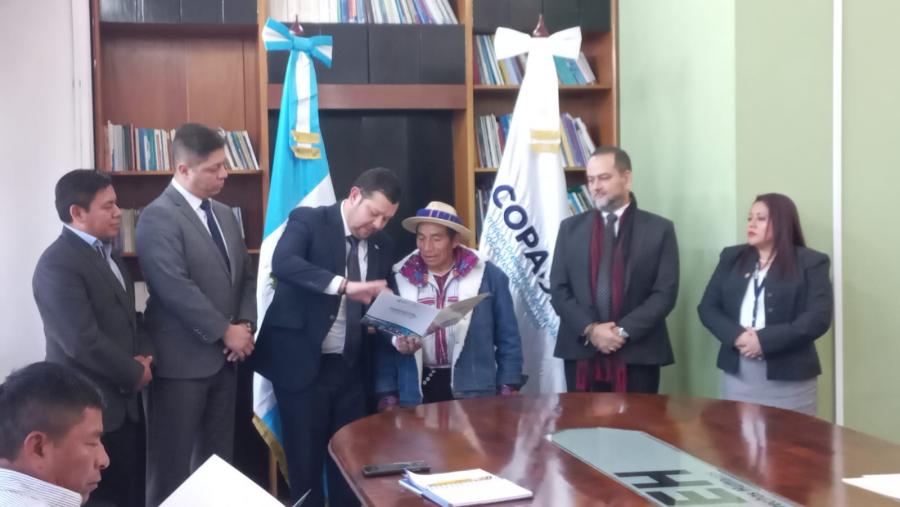In counterinsurgency warfare, victory is rarely definitive. In Guatemala the Left has been fighting off and on for at least twenty years. The army may temporarily secure roads, and cordon off administrative centers of outlying communities, however, roads are always vulnerable and such administrative centers soon become void of civic life. In the end, an army that cannot readily see its enemy often declares war on its people and on the land itself.
By the roadside at the southern entrance to Santa Cruz del Quiché is a government sign which announces that the town has rejected communist conspiracy and foreign mercenaries. Judging from the number of troops and sandbagged positions around the plaza, one wonders how much choice the people had. The citizens of the next town down the road, for example, have nearly deserted the place. The countryside is barren for some fifty miles, until Sacapulas. There are dozens of abandoned farms; the fields have been burnt but not in preparation for planting. From Sacapulas the road to Nebaj clings precariously to the side of the Cuchumatane Mountains. For security reasons, the army has ordered all vegetation cleared for twenty meters on either side of this and many other roads in Guatemala. Even with cypress and pine trees holding the roadbed in place, it frequently washes away in the rainy season. Now at the onset of the first rains, one can peer over tree stumps down a precipitous slope and wonder what guerrilla force would have been foolish enough to attack up an eighty-five degree slope?
Until the revolution Nebaj was a quiet town isolated in the corner of a long valley and surrounded by steep mountains. The EGP (Guerrilla Army of the Poor) took control of Nebaj in January, 1979. One landowner was killed. The rest of the townspeople were subjected to a series of public lectures. As recently as July 1982 the EGP controlled the single road into the valley.
Today, although guerrillas control much of the hinterland, the army firmly controls Nebaj. The town center is an armed camp. Ten sandbagged gun emplacements cordon off an area defined by the army as the strategic heart of the town - a cluster of now-vacant buildings that once housed the school and government offices. Across the plaza a few stores are reopening; businessmen who had fled to the capital are returning. One, a long-time resident, surveys the plaza, pointing out the widows. Inside his home he introduces the new members of his family, four young recently orphaned children. He offers dinner, serving meat he cannot afford: there were once hundreds of cattle in the valley, but they were slaughtered to feed the army.
The presence of the army has left the predominantly Ixil Indian population in a tragic position. Agricultural plots that lie at a distance from the town remain fallow. The army claims that the Indians fear the guerrilleros; the people say that to visit the fields is to be labelled subversive by the army. Whatever the cause, the outcome is the same. The fields are not tilled. There was no harvest at all in January: the people, already hungry, must purchase maize for another entire year. Government maize sells for 60c for five pounds. A family of eight requires ten pounds a day. Under its "techo, tortillas y trabajo" program the government sponsors massive public works projects. Offering maize in exchange for labor, the government currently employs hundreds of men on roadwork in Nebaj. Still, there is not work for all; in Nebaj alone there are 12,000 displaced people. The unemployed men anxiously cut and plant new millpas in the vicinity of the town. Although, with the beginning of the rains, the first seed is being planted, for months people will remain dependent on the army for food.
Civil Patrols
The showpiece of the Montt regime is the network of civil patrols spawned by the now defunct "fusiles y frijoles" program which over 350,000 Indians have reportedly joined. Ostensibly, these patrols are organized to provide rural communities with a self-help civil defense against guerrillas. In practice, they are a highly effective means of social control. All adult men must serve one twenty-four or two twelve-hour shifts a week, and Sundays are reserved for compulsory patriotic parades or physical fitness training. The obligatory commitment of at least two days a week is impossible for subsistence agriculturalists. The problem is exacerbated in communities like Nebaj where, because of the war, there is an increased need for labor to cut new millpas close to the community center. Thus, one result of the program is a further disruption of agricultural production and increased dependence on government supplies.
Army informants within the patrols keep track of all the adult men in every community: to shirk one's duty is a sign of collaboration with the guerrillas.
The roads throughout the country are replete with checkpoints, each of which is maintained by five to ten men who under normal circumstances would be tilling their millpas. For example, between Huehuetenango and Todos Santos, a distance of perhaps 45 km, one passes six checkpoints. These patrols, like others observed throughout the country, do carefully monitor traffic; a task that the army alone could not perform. Hence the civil patrols allow the government a means both to check the flow of supplies and personnel on the nation's roads and to police the rural populace.
The official government position, that the civil patrols are closely allied with the army, is suspect. Why are the patrols so poorly armed? In over forty patrols, the most sophisticated weapon observed was the M-1 carbine. Most patrols have only a couple of .22 rifles; some have only wooden poles and pitchforks.
One of the principal logistical difficulties of the army is knowledge of the local terrain. Why, the EGP asks privately, haven't the civil patrols given away guerrilla positions? Why does the army intimidate the patrols? In Nebaj one man recounted the time the army arrested two men while they were working their millpa, and charged them with subversion. One of the men had been marginally associated with the EGP. The other had had no contact whatsoever. The army presented these men to the Nebaj civil patrol. The patrol leader was commanded to kill them. He hesitated, suggesting that it was the task of the army, for the patrol had no rifles. At this the army commander ordered the patrol to kill the prisoners with machetes. Fearing for their own lives, the civil patrol complied.
Revolution within the Revolution
Clearly, a year after Ríos Montt took control, the Left is in trouble. Even sympathetic observers admit that their presence in the capital is nominal. Supply and movement of personnel has been severely disrupted by civil patrols. Moreover, the army provides food to the people, something guerrillas have promised but never been able to deliver. Though the EGP has, publicly stated that it will not attack the civil patrols, and though the patrols assiduously avoid the guerrilla strongholds, there have been clashes. With its back to the wall the EGP has made mistakes. A popular and apparently accurate account describes a guerrilla roadblock where a recalcitrant old campesino who refused to leave the bus was executed. Though such incidents have been sporadic, and hardly compare to the systematic massacres perpetrated by the army, they are tragic and fuel the suspicion and tension between the indigenous rank and file and the predominantly Ladino leadership. As the Left is increasingly pressured by government forces, its leadership may feel forced to sacrifice ethnic differences to forge a single disciplined fighting force. Already indigenous leaders talk of a second revolution - the revolution within the revolution that would reflect purely indigenous needs and goals. Yet indigenous leaders recognize that the second revolution can only occur if the first succeeds.
Guatemala City - The Final Act of the Spanish Conquest
For the last several months Rios Montt has been telling Guatemala that its troubles are over. Slick blue and white posters in every government office tell the employees that they "have the obligation to change" - they must "not rob, abuse the people or lie." During the Lucas regime civilian casualties were always the responsibility of guerrilleros. Now (in an astonishing admission of institutional culpability), Montt blames the previous regime, and casts himself in the role of a reformer - a remarkable stance considering that his regime has perpetrated the war's most brutal atrocities.
There is little to suggest that the Montt dictatorship is fundamentally different from the regime of Lucas Garcia. Today's uneasy calm is less a harbinger of real change than a lull in the struggle. As Alain Nairn suggests, a decrease in blatant human rights violations means little in a nation locked in civil war. The point is not whether or not the regime is killing fewer civilians than the last, during this momentary lull. The struggle in Guatemala rises from the very foundations of its social structure. Ríos Montt represents certain vested interests in the country and has taken no steps that indicate a willingness to compromise those interests. Reform loses its meaning in a country whose economic disparities are such that even moderate change cannot occur without drastically affecting the established order. In the past Ríos Montt has displayed the capacity for brutal repression. He killed. He killed as recently as last month on the eve of the Pope's visit. As long as those who govern remain unwilling to share power with Indian people, he will have to kill again.
It is now intermission. Soon the curtain will rise again on this, the final act of the Spanish Conquest.
In the meantime, the fate of the Montt regime will depend on its ability to maintain an illusion of change. For this reason, many are watching the current amnesty program (which expired April 30) to see if, like the first, it will be followed by a period of increased repression. For now, in a country noticeably weary of war, the illusion holds. The state of siege has been lifted, the roads are all open and even the tourists are returning. Once again Panajachel is crawling with sleepy young gringos.
An assistant to the US consul recently travelled to Chichicastenango in a commercial tour bus. Upon her return she announced to the press that she had been "to the heart of guerrilla country," and that all was back to normal. Normal - a loaded word in a country where truth itself is a refugee.
Article copyright Cultural Survival, Inc.


